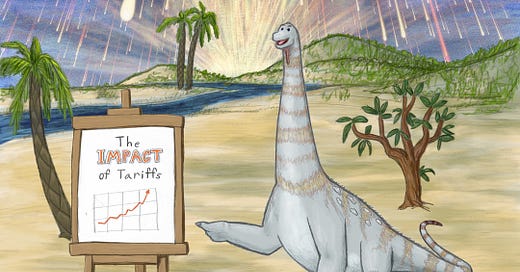I talked about the tariff situation on the Pricing Evolution Podcast a week and a half ago, but since it’s something which is a major focus for so many businesses right now, there’s lots more to cover.
In this piece, I’m going to focus on why the tariffs are a major threat to profitability and even survival for many businesses and what businesses need to do in order to survive and thrive in this new environment.
Think for a bit about why we don’t have living dinosaurs today. 65 million years ago, a giant asteroid hit the earth, causing a whole series of environmental catastrophes, from short term ones like tidal waves and forest fires to longer term ones such as a sudden ice age caused by dust and soot particles in the atmosphere blocking sunlight.
This caused a major extinction event, with many of the species which had been present before the impact dying out, and today’s animal life being descendants of the survivors. The dinosaurs didn’t make it. (Or thought of another way: the only ones which did were those small, feathered ones whose descendants we today call birds.)
But think for a minute about why an environmental disaster like this causes animals to go extinct. Animals are adapted to a particular environment. If that environment changes, the animal population needs to find a way to a survive in the new circumstances or else it doesn’t survive at all.
Often you’ll hear about how “well adapted” some particular animal is, for instance because it has developed the ability to survive on one particular food source which is toxic to other creatures. That is certainly an example of being well adapted to that specific environment, but if the environment changes, that animal may not be well adapted to the new environment which follows.
Many species go extinct during a period of sudden and drastic environmental change because the adaptations which had suited them to the way things were before leave them unsuited to surviving amidst the new conditions.
So for instance, the koala bears which today are so well suited to eating only eucalyptus leaves (which are toxic to other animals) would not be well suited to an environment which was suddenly without eucalyptus. While, on the other hand, animals which are very flexible in their habits (say, racoons) can survive in a wider variety of environmental conditions.
I bring all this up because there’s a similarity to what many businesses are facing right now. The businesses that have been successful up until now were well adapted to the business environment which existed up until this point, a business environment which included low barriers to trade.
As a result, many companies became successful by sourcing different components for their products from different parts of world.
The sudden imposition of significant tariffs has upended that order. Business structures which were very well adapted to the prior environment are in some cases now very badly adapted to these new conditions.
So, for instance, consider a business that had been able to offer very competitive prices while also being profitable because it was very good at sourcing products from China. That adaptation which was very successful up until a couple months ago is now very un-successful.
On the other hand, a company which was struggling to explain to customers why they should pay more for their Made in America products may suddenly find itself a low-cost player.
To survive this rapidly changing environment, companies need to first make sure they are not destroyed by the change itself.
This means doing everything which can be done quickly and relatively affordably to minimize tariff impact by sourcing from different suppliers or doing your manufacturing work in different countries to minimize your tariff exposure. (I emphasize “quickly and relatively affordably” because the situation is changing quickly, and you don’t want to commit to a major investment such as building a new facility only to discover that the situation has changed again.)
What tariff costs companies are not able to avoid, they’ll need to pass on to their customers by taking a price increase or adding a surcharge which covers the cost of the tariff. There may be strategic circumstances in which companies choose to absorb some tariff costs in order to maintain current prices for their customers, but for some products and countries, the tariffs are sufficiently high that trying to absorb the impact will quickly bleed away a company’s cash.
However, these two tactics — minimizing impact and passing on the remaining cost through price — can at best keep your company from being too badly damaged by the tariffs themselves. The bigger question is: how can your company actually grow and thrive in the new environment?
This means looking at the changed environment in your particular industry and determining what new opportunities have been opened up by these changes.
There may be areas of the market where you could not compete before but where you are now suddenly competitive. Did you sell higher quality products made in the Americas or Europe, while imports from China dominated the lower end of the price and quality range in your industry? You may now have the higher quality and also the lower price.
Between tariffs and export restrictions, there may suddenly be opportunities in your industry which did not exist before.
So as soon as you have protected yourself from bleeding cash as a result of the new tariffs, the next thing you should be doing is identifying those new opportunities which may have been made available.
In a sudden environmental change like this, it’s the creatures which adapt quickly and expand which will dominate the new world.





